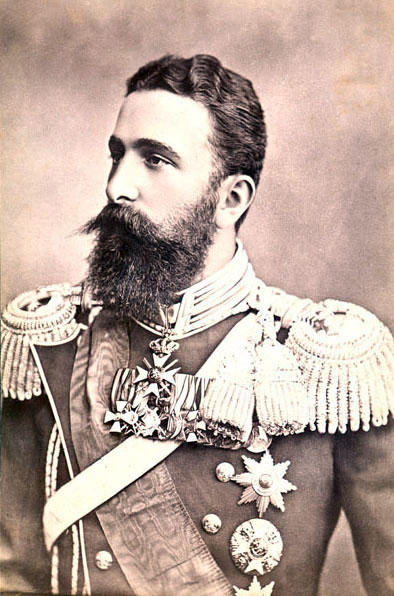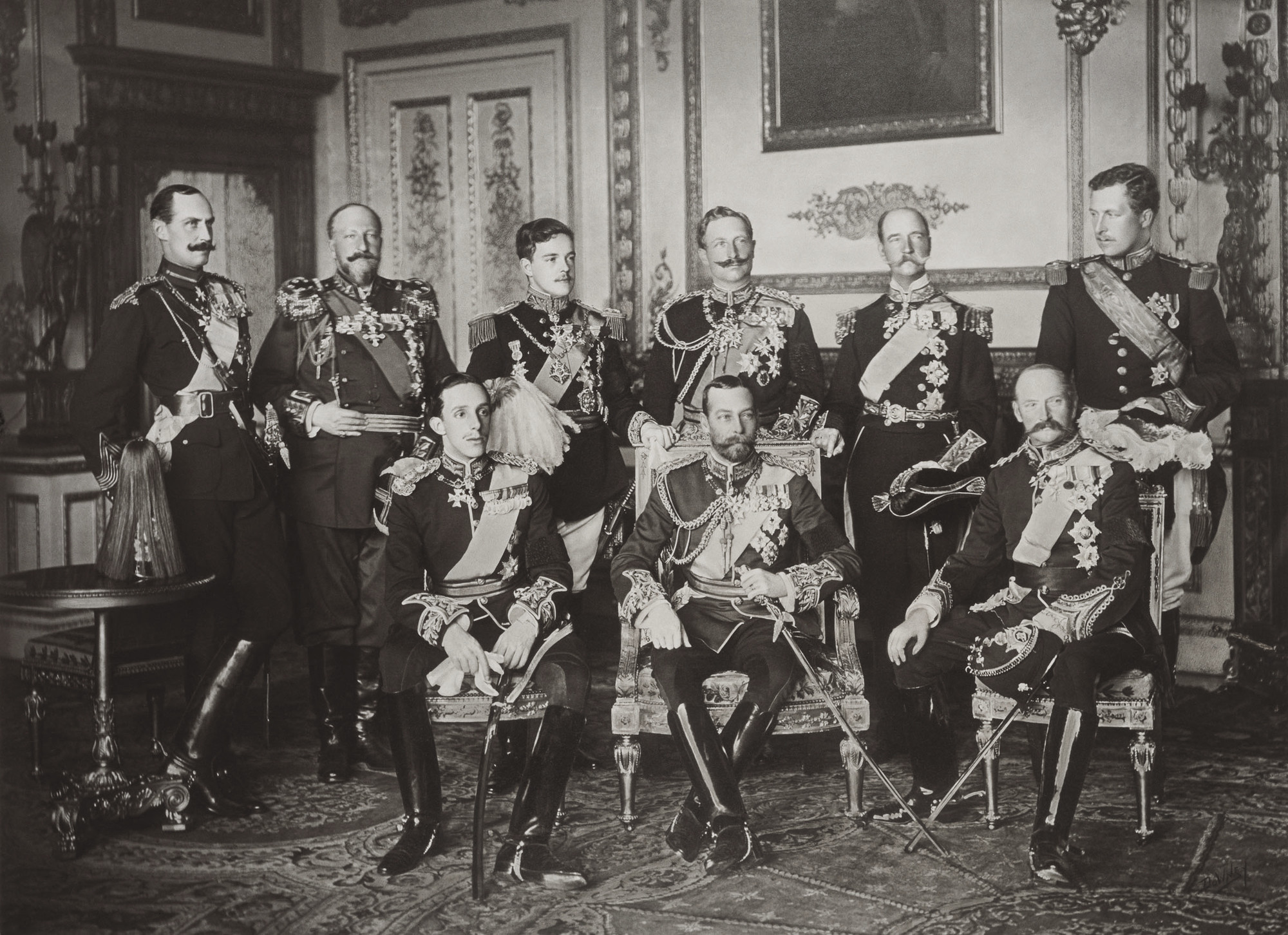|
Tsardom Of Bulgaria (1908–1946)
The Tsardom of Bulgaria (), also known as the Third Bulgarian Tsardom (), usually known in English as the Kingdom of Bulgaria, or simply Bulgaria, was a constitutional monarchy in Southeastern Europe, which was established on , when the Bulgarian state was raised from a principality to a tsardom. Prince Ferdinand, founder of the royal family, was crowned as tsar at the Declaration of Independence, mainly because of his military plans and for seeking options for unification of all lands in the Balkans region with an ethnic Bulgarian majority (lands that had been seized from Bulgaria and given to the Ottoman Empire in the Treaty of Berlin). He and his successors were reckoned as kings internationally. The state was almost constantly at war throughout its existence, lending to its nickname as "the Balkan Prussia". For several years Bulgaria mobilized an army of more than 1 million people from its population of about 5 million, and in the 1910s it engaged in three wars – the Firs ... [...More Info...] [...Related Items...] OR: [Wikipedia] [Google] [Baidu] |
Constitutional Monarchy
Constitutional monarchy, also known as limited monarchy, parliamentary monarchy or democratic monarchy, is a form of monarchy in which the monarch exercises their authority in accordance with a constitution and is not alone in making decisions. Constitutional monarchies differ from absolute monarchies (in which a monarch is the only decision-maker) in that they are bound to exercise powers and authorities within limits prescribed by an established legal framework. A constitutional monarch in a parliamentary democracy is a hereditary symbolic head of state (who may be an emperor, king or queen, prince or grand duke) who mainly performs representative and civic roles but does not exercise executive or policy-making power. Constitutional monarchies range from countries such as Liechtenstein, Monaco, Morocco, Jordan, Kuwait, Bahrain and Bhutan, where the constitution grants substantial discretionary powers to the sovereign, to countries such as the United Kingdom and other Com ... [...More Info...] [...Related Items...] OR: [Wikipedia] [Google] [Baidu] |
Unity Makes Strength
"Unity makes strength"; ; ; . is a motto that has been used by various states and entities throughout history. It is used by Belgium, Bulgaria, Malaysia and Georgia (country), Georgia on their national coat of arms, coats of arms and is the national motto of Belgium, Bolivia, Malaysia, Georgia (country), Georgia and Bulgaria. The phrase was first used as national motto by the Dutch Republic. However its use predates the republic's independence, appearing for example as part of mottos and proverbs known as ''Gemeene Duytsche Spreekwoorden'', which was published in 1550, back when the place was under the Habsburg empire of Charles V, Holy Roman Emperor, Charles V, which ruled over modern day Netherlands and Belgium. This was derived originally from a Greek phrase (, ) attributed to Homer, dating to roughly 850 BC, that later appears similarly in the Latin phrase ''concordia res parvae crescunt'' ("small things flourish by concord"), which was used in the ''Bellum Jugurthinum'' ... [...More Info...] [...Related Items...] OR: [Wikipedia] [Google] [Baidu] |
Aleksandar Malinov
Aleksandar Pavlov Malinov (; 3 May 1867 – 20 March 1938) was a leading Bulgarian politician who served as Prime Minister on three occasions. He was born in Pandakli, Bessarabia (present-day Orikhivka, Ukraine) in a family of Bessarabian Bulgarians. Malinov was known for his support for close ties to Russia and he pursued this policy during his first ministry of 1908-1911. Malinov, who veered towards liberalism, presided over a relatively unremarkable tenure during which his main concern was stabilising the newly independent country. He was vehemently opposed to the increasing economic links with Germany which followed his period of office. He urged Vasil Radoslavov to follow a policy of neutrality after the outbreak of the First World War, fearing that Germany would simply exploit Bulgarian resources for her own war effort. He was recalled as Prime Minister in 1918 specifically to attempt to negotiate an Armistice with the Allies as he had a reputation for moderation and ... [...More Info...] [...Related Items...] OR: [Wikipedia] [Google] [Baidu] |
List Of Bulgarian Monarchs
The monarchs of Bulgaria ruled Bulgaria during the medieval First ( 681–1018) and Second (1185–1422) Bulgarian empires, as well as during the modern Principality (1879–1908) and Kingdom (1908–1946) of Bulgaria. This list includes monarchs from the establishment of the First Bulgarian Empire until modern times, omitting earlier mythical rulers as well as rulers of separate states such as Old Great Bulgaria and Volga Bulgaria. Various titles have been used by the rulers of Bulgaria. The only recorded title, used before Bulgaria's conversion to Christianity, is '' kanasubigi'', likely meaning " Khan, Lord of the Army" or "the sublime Khan". When Bulgaria converted to Christianity in the ninth century, the ruler Boris I (852–889) was using the title ''knyaz'' (prince). For much of its later history under the first and second empires, Bulgaria functioned as a multi-ethnic imperial state modelled on the neighbouring Byzantine Empire, which contributed to the adoption of th ... [...More Info...] [...Related Items...] OR: [Wikipedia] [Google] [Baidu] |
Simeon II Of Bulgaria
Simeon Borisov Saxe-Coburg-Gotha (, ; born 16 June 1937) is a Bulgarian politician who reigned as the last Tsar of the Tsardom of Bulgaria as Simeon II from 1943 until 1946. In 1946, the monarchy was abolished by a referendum, forcing Simeon into exile. Following the fall of communism in Bulgaria, Simeon returned to his home country in 1996, and founded the National Movement for Stability and Progress party (also known as the National Movement Simeon II party). After winning the 2001 election as its leader, Simeon proceeded to govern Bulgaria as prime minister of the Republic of Bulgaria from 2001 to 2005. Simeon was six years old when his father Boris III of Bulgaria died in 1943. Royal power was exercised on his behalf by a regency council led by Simeon's uncle Kiril, Prince of Preslav, General Nikola Mihov and prime minister, Bogdan Filov. Following his premiership from 2001 to 2005, in the next election, as leader of NDSV, Simeon entered a coalition government wi ... [...More Info...] [...Related Items...] OR: [Wikipedia] [Google] [Baidu] |
Ferdinand I Of Bulgaria
Ferdinand I (Ferdinand Maximilian Karl Leopold Maria; 26 February 1861 – 10 September 1948) was Prince of Bulgaria from 1887 to 1908 and Tsar of Bulgaria from 1908 until his abdication in 1918. Under his rule, Bulgaria entered the First World War on the side of the Central Powers in 1915. Family background Ferdinand was born on 26 February 1861 in Vienna, Louda, 1981, ''Lines of Succession'', Table 149 a German prince of the House of Saxe-Coburg and Gotha-Koháry. He was the son of Prince August of Saxe-Coburg and his wife Clémentine of Orléans, daughter of King Louis Philippe I of France. Princess Maria Antonia Koháry was a Hungarian Noble and heiress who married Ferdinand's grandfather, Prince Ferdinand of Saxe-Coburg and Gotha. Ferdinand was raised in his parents’ Catholic faith and baptised in St. Stephen's Cathedral, Vienna on 27 February, having as godparents Archduke Maximilian of Austria and his wife Princess Charlotte of Belgium. He grew up in the cos ... [...More Info...] [...Related Items...] OR: [Wikipedia] [Google] [Baidu] |
Bulgarian Lev
The ''lev'' (, plural: / , ; ISO 4217 code: BGN; numeric code: 975) is the currency of Bulgaria. In old Bulgarian, the word ''lev'' meant "lion"; the word "lion" in the modern language is ''lаv'' (; in Bulgarian: ). The lev is divided in 100 ''stotinki'' (, singular: , ). ''Stotinka'' in Bulgarian means "a hundredth" and in fact is a translation of the French term "centime." Grammatically, the word ''stotinka'' comes from the word "sto" (сто; a hundred). Since 1997, the lev has been in a currency board arrangement, initially with the Deutsche Mark at a fixed rate of BGL 1000 to DEM 1. After the introduction of the euro and the redenomination of the lev in 1999, this has resulted in a fixed rate to the euro of BGN 1.95583 : EUR 1. Since 2020, the lev has been a part of the European Exchange Rate Mechanism (ERM II). In November 2023, Bulgarian euro coin designs were revealed and approved by the Bulgarian National Bank. Bulgaria will replace the Bulgarian lev with the euro on 1 ... [...More Info...] [...Related Items...] OR: [Wikipedia] [Google] [Baidu] |
Bulgarians
Bulgarians (, ) are a nation and South Slavs, South Slavic ethnic group native to Bulgaria and its neighbouring region, who share a common Bulgarian ancestry, culture, history and language. They form the majority of the population in Bulgaria, while in Bulgarians in North Macedonia, North Macedonia, Bulgarians in Ukraine, Ukraine, Bessarabian Bulgarians, Moldova, Bulgarians in Serbia, Serbia, Bulgarians in Albania, Albania, Bulgarians in Romania, Romania, Bulgarians in Hungary, Hungary and Bulgarians in Greece, Greece they exist as historical communities. Etymology Bulgarians derive their ethnonym from the Bulgars. Their name is not completely understood and difficult to trace back earlier than the 4th century AD, but it is possibly derived from the Proto-Turkic word ''*bulģha'' ("to mix", "shake", "stir") and its derivative ''*bulgak'' ("revolt", "disorder"). Alternative etymologies include derivation from a compound of Proto-Turkic (Oghuric languages, Oghuric) ''*bel'' ("fi ... [...More Info...] [...Related Items...] OR: [Wikipedia] [Google] [Baidu] |
Eastern Orthodoxy
Eastern Orthodoxy, otherwise known as Eastern Orthodox Christianity or Byzantine Christianity, is one of the three main Branches of Christianity, branches of Chalcedonian Christianity, alongside Catholic Church, Catholicism and Protestantism. Like the Pentarchy of the first millennium, the mainstream (or "Canon law of the Eastern Orthodox Church, canonical") Eastern Orthodox Church is Organization of the Eastern Orthodox Church, organised into autocephalous churches independent from each other. In the 21st century, the Organization of the Eastern Orthodox Church#Autocephalous Eastern Orthodox churches, number of mainstream autocephalous churches is seventeen; there also exist Organization of the Eastern Orthodox Church#Unrecognised churches, autocephalous churches unrecognized by those mainstream ones. Autocephalous churches choose their own Primate (bishop), primate. Autocephalous churches can have Ecclesiastical jurisdiction, jurisdiction (authority) over other churches, som ... [...More Info...] [...Related Items...] OR: [Wikipedia] [Google] [Baidu] |
Bulgarian Language
Bulgarian (; , ) is an Eastern South Slavic, Eastern South Slavic language spoken in Southeast Europe, primarily in Bulgaria. It is the language of the Bulgarians. Along with the closely related Macedonian language (collectively forming the East South Slavic languages), it is a member of the Balkan sprachbund and South Slavic languages, South Slavic dialect continuum of the Indo-European language family. The two languages have several characteristics that set them apart from all other Slavic languages, including the elimination of grammatical case, case declension, the development of a suffixed definite article, and the lack of a verb infinitive. They retain and have further developed the Proto-Slavic language, Proto-Slavic verb system (albeit analytically). One such major development is the innovation of evidentiality, evidential verb forms to encode for the source of information: witnessed, inferred, or reported. It is the official Languages of Bulgaria, language of Bulgar ... [...More Info...] [...Related Items...] OR: [Wikipedia] [Google] [Baidu] |
Marko Nešić Shumi Maritsa
Marko may refer to: * Marko (given name) * Marko (surname) * Márkó, a village in Hungary See also *Marco (other) *Markko (other) *Marka (other) *Markov *Marku *Narko, Queensland Narko is a rural locality in the Toowoomba Region, Queensland Queensland ( , commonly abbreviated as Qld) is a States and territories of Australia, state in northeastern Australia, and is the second-largest and third-most populous stat ... * Narco (other) * * {{disambiguation, surname ... [...More Info...] [...Related Items...] OR: [Wikipedia] [Google] [Baidu] |





